- Home
- Robert Harris
The Ghost Page 3
The Ghost Read online
Page 3
Quigley, still reeling from Maddox’s put-down, attempted a comeback. ‘Actually, I know quite a good writer on the Guardian who uses a gym.’
‘Maybe,’ said Rick, after an embarrassed pause, ‘we could run over how you see this working practically.’
‘First off, we need it wrapped up in a month,’ said Maddox. ‘That’s Marty’s view as well as mine.’
‘A month?’ I repeated. ‘You want a book in a month?’
‘A completed manuscript does exist,’ said Kroll. ‘It just needs some work.’
‘A lot of work,’ said Maddox grimly. ‘Okay. Taking it backwards: we publish in June, which means we ship in May, which means we edit and we print in March and April, which means we have to have the manuscript in house at the end of February. The Germans, French, Italians and Spanish all have to start translating right away. The newspapers need to see it for the serial deals. There’s a television tie-in. Publicity tour’s got to be fixed well in advance. We need to book space in the stores. So the end of February – that’s it, period. What I like about your résumé,’ he said, consulting a sheet of paper on which I could see all my titles listed, ‘is that you’re obviously experienced and above all you’re fast. You deliver.’
‘Never missed once,’ said Rick, putting his arm round my shoulders and squeezing me. ‘That’s my boy.’
‘And you’re a Brit. The ghost definitely has to be a Brit, I think. To get the jolly old tone right.’
‘We agree,’ said Kroll. ‘But everything will have to be done in the States. Adam’s completely locked in to a lecture tour there right now, and a fundraising programme for his foundation. I don’t see him coming back to the UK till March at the earliest.’
‘A month in America, that’s fine – yes?’ Rick glanced at me eagerly. I could feel him willing me to say yes, but all I was thinking was, A month, they want me to write a book in a month …
I nodded slowly. ‘I suppose I can always bring the manuscript back here to work on.’
‘The manuscript stays in America,’ said Kroll flatly. ‘That’s one of the reasons Marty made the house on the Vineyard available. It’s a secure environment. Only a few people are allowed to handle it.’
‘Sounds more like a bomb than a book!’ joked Quigley. Nobody laughed. He rubbed his hands unhappily. ‘You know, I will need to see it myself at some point. I am supposed to be editing it.’
‘In theory,’ said Maddox. ‘Actually we need to talk about that later.’ He turned to Kroll. ‘There’s no room in this schedule for revisions. We’ll need to revise as we go.’
As they carried on discussing the timetable I studied Quigley. He was upright but motionless, like one of those victims in the movies who gets stuck with a stiletto while standing in a crowd and dies without anyone noticing. His mouth opened and closed ever so slightly, as if he had a final message to impart. Yet even at the time I realised he’d asked a perfectly reasonable question. If he was the editor, why shouldn’t he see the manuscript? And why did it have to be held in a ‘secure environment’ on an island off the eastern seaboard of the USA? I felt Rick’s elbow in my ribs and realised Maddox was talking to me.
‘How soon can you get over there? Assuming we go with you rather than one of the others – how fast can you move?’
‘It’s Friday today,’ I said. ‘Give me a day to get ready. I could fly Sunday.’
‘And start Monday? That would be great.’
Rick said, ‘You won’t find anyone who can move quicker than that.’
Maddox and Kroll looked at one another and I knew then that I had the job. As Rick said afterwards, the trick is always to put yourself in their position. ‘It’s like interviewing a new cleaner. Do you want someone who can give you the history of cleaning, and the theory of cleaning, or do you want someone who’ll just get down and clean your fucking house? They chose you because they think you’ll clean their fucking house.’
‘We’ll go with you,’ said Maddox. He stood and reached over and shook my hand. ‘Subject to reaching a satisfactory agreement with Rick here, of course.’
Kroll added, ‘You’ll also have to sign a nondisclosure agreement.’
‘No problem,’ I said, also getting to my feet. That didn’t bother me. Confidentiality clauses are standard procedure in the ghosting world. ‘I couldn’t be happier.’
And I couldn’t have been. Everyone except Quigley was smiling and suddenly there was a kind of boys-together, locker-room-after-the-match kind of feeling in the air. We chatted for a minute or so, and that was when Kroll took me to one side and said, very casually, ‘I’ve something here you might care to take a look at.’
He reached under the table and pulled out a bright yellow plastic bag with the name of some fancy Washington clothes store printed on it in curly black copperplate. My first thought was that it must be the manuscript of Lang’s memoirs, and that all the stuff about a ‘secure environment’ had been a joke. But when he saw my expression, Kroll laughed and said, ‘No, no, it’s not that. It’s just a book by another client of mine. I’d really appreciate your opinion if you get a chance to look at it. Here’s my number.’ I took his card and slipped it into my pocket. Quigley still hadn’t said a word.
‘I’ll give you a call when we’ve settled the deal,’ said Rick.
‘Make them howl,’ I told him, squeezing his shoulder.
Maddox laughed. ‘Hey! Remember!’ he called as Quigley showed me out of the door. He struck his big fist against his blue-suited chest. ‘Heart!’
As we went down in the lift, Quigley stared at the ceiling. ‘Was it my imagination or did I just get fired in there?’
‘They wouldn’t let you go, Roy,’ I said, with all the sincerity I could muster, which wasn’t much. ‘You’re the only one left who can remember what publishing used to be like.’
‘“Let you go”,’ he said bitterly. ‘Yes, that’s the modern euphemism, isn’t it? As if it’s a favour. You’re clinging to the edge of a cliff and someone says, “Oh, I’m terribly sorry, we’re going to have to let you go.”’
A couple on their lunch break got in at the fourth floor and Quigley was silent until they got off to go to the restaurant on the second. When the doors closed, he said, ‘There’s something not right about this project.’
‘Me, you mean?’
‘No. Before you.’ He frowned. ‘I can’t quite put my finger on it. The way no one’s allowed to see anything, for a start. And that fellow Kroll makes me shiver. And poor old Mike McAra, of course. I met him when we signed the deal two years ago. He didn’t strike me as the suicidal type. Rather the reverse. He was the sort who specialised in making other people want to kill themselves, if you know what I mean.’
‘Hard?’
‘Hard, yes. Lang would be smiling away, and there would be this thug next to him with eyes like a snake’s. I suppose you’ve got to have someone like that when you’re in Lang’s position.’
We reached the ground floor and stepped out into the lobby. ‘You can pick up a taxi round the corner,’ said Quigley, and for that one small, mean gesture – leaving me to walk in the rain rather than calling me a cab on the company’s account – I hoped he’d rot. ‘Tell me,’ he said suddenly, ‘when did it become fashionable to be stupid? That’s the thing I really don’t understand. The Cult of the Idiot. The Elevation of the Moron. Our two biggest-selling novelists – the actress with the tits and that ex-army psycho – have never written a word of fiction, did you know that?’
‘You’re talking like an old man, Roy,’ I told him. ‘People have been complaining that standards are slipping ever since Shakespeare started writing comedies.’
‘Yes, but now it’s really happened, hasn’t it? It was never like this before.’
I knew he was trying to goad me – the ghostwriter to the stars off to produce the memoirs of an ex-prime minister – but I was too full of myself to care. I wished him well in his retirement and set off across the lobby swinging that damned yellow pla
stic bag.
*
It must have taken me half an hour to find a ride back into town. I had only a very hazy idea of where I was. The roads were wide, the houses small. There was a steady, freezing drizzle. My arm was aching from carrying Kroll’s manuscript. Judging by the weight, I reckoned it must have been close on a thousand pages. Who was his client? Tolstoy? Eventually I stopped at a bus shelter in front of a greengrocer and a funeral parlour. Wedged into its metal frame was the card of a minicab firm.
The journey home took almost an hour and I had plenty of time to take out the manuscript and study it. The book was called One Out of Many. It was the memoir of some ancient US senator, famous only for having kept on breathing for about a hundred and fifty years. By any normal measure of tedium it was off the scale – up, up and away, beyond boring into some oxygen-starved stratosphere of utter nullity. The car was overheated and smelled of stale takeaways. I began to feel nauseous. I put the manuscript back into the bag and wound down the window. The fare was forty pounds.
I had just paid the driver and was crossing the pavement towards my flat, head down into the rain, searching for my keys, when I felt someone touch me lightly on the shoulder. I turned and walked into a wall, or was hit by a truck – that was the feeling: some great iron force slammed into me and I fell backwards, into the grip of a second man. (I was told afterwards there were two of them, both in their twenties. One had been hanging round the entrance to the basement flat, the other appeared from nowhere and grabbed me from behind.) I crumpled, felt the gritty wet stone of the gutter against my cheek and gasped and sucked and cried like a baby. My fingers must have clasped the plastic bag with involuntary tightness, because I was conscious, through this much greater pain, of a smaller and sharper one – a flute in the symphony – as a foot trod on my hand, and something was torn away.
Surely one of the most inadequate words in the English language is ‘winded’, suggestive as it is of something light and fleeting – a graze, perhaps, or a touch of breathlessness. But I hadn’t been winded. I had been whumped and whacked and semi-asphyxiated, knocked to the ground and humiliated. My solar plexus felt as though it had been stuck with a knife. Sobbing for air, I was convinced I had been stabbed. I was aware of people taking my arms and pulling me up into a sitting position. I was propped against a tree, its hard bark jabbing into my spine, and when at last I managed to gulp some oxygen into my lungs, I immediately started patting my stomach blindly, feeling for the gaping wound I knew must be there, imagining my intestines strewn around me. But when I inspected my moist fingers for blood, there was only dirty London rainwater. It must have taken a minute for me to realise that I wasn’t going to die – that I was, essentially, intact – and then all I wanted was to get away from these good-hearted folk who had gathered around me, and were producing mobile phones and asking me about calling the police and an ambulance.
The prospect of having to wait ten hours to be examined in casualty, followed by half a day spent hanging around the local police station to make a statement, was enough to propel me out of the gutter, up the stairs and into my flat. I locked the door, peeled off my outer clothes, and went and lay on the sofa, trembling. I didn’t move for perhaps an hour, as the cold shadows of that January afternoon gradually gathered in the room. Then I went into the kitchen and was sick in the sink, after which I poured myself a very large whisky.
I could feel myself moving now out of shock and into euphoria. Indeed, with a little alcohol inside me I felt positively merry. I checked my inside jacket pocket and then my wrist: I still had my wallet and my watch. The only thing that had gone was the yellow plastic bag containing Senator Alzheimer’s memoirs. I laughed out loud as I pictured the thieves running down Ladbroke Grove and stopping in some alleyway to check their haul: ‘My advice to any young person seeking to enter public life today …’ It wasn’t until I’d had another drink that I realised this could be awkward. Old Alzheimer might not mean anything to me, but Sidney Kroll might view matters differently.
I took out his card. Sidney L. Kroll of Brinkerhof Lombardi Kroll, attorneys, M Street, Washington DC. After thinking about it for ten minutes or so, I went back and sat on the sofa and called his cell phone. He answered on the second ring: ‘Sid Kroll.’
I could tell by his inflexion he was smiling.
‘Sidney,’ I said, trying to sound natural using his first name, ‘you’ll never guess what’s happened.’
‘Some guys just stole my manuscript?’
For a moment I couldn’t speak. ‘My God,’ I said, ‘is there nothing you don’t know?’
‘What?’ His tone changed abruptly. ‘Jesus,’ he said, ‘I was kidding. Is that really what happened? Are you okay? Where are you now?’
I explained what had happened. He said not to worry. The manuscript was totally unimportant. He’d only given it to me because he thought it might be of interest to me in a professional capacity. He’d get another sent over. What was I going to do? Was I going to call the police? I said I would if he wanted, but as far as I was concerned, bringing in the police was generally more trouble than it was worth. I preferred to view the episode as just another round on the gaudy carousel of urban life: ‘You know, que será será, bombed one day, mugged the next.’
He agreed. ‘It was a real pleasure to meet with you today. It’s great that you’re on board. Cheerio,’ he said, just before he hung up, and there was that little smile in his voice again. Cheerio.
I went into the bathroom and opened my shirt. A livid red horizontal mark was branded into my flesh, just above my stomach and below my ribcage. I stood in front of the mirror for a better look. It was three inches long and half an inch wide, and curiously sharp-edged. That wasn’t caused by flesh and bone, I thought. I’d say that was a knuckleduster. That looked professional. I started to feel strange again and went back to the sofa.
When the phone rang it was Rick, to tell me the deal was done. ‘What’s up?’ he said, interrupting himself. ‘You don’t sound right.’
‘I just got mugged.’
‘No!’
Once more I described what had happened. Rick made appropriately sympathetic noises, but the moment he learned I was well enough to work, the anxiety left his voice. As soon as he could, he brought the conversation round to what really interested him.
‘So you’re still fine to fly to the States on Sunday?’
‘Of course, I’m just a bit shocked, that’s all.’
‘Okay, well, here’s another shock for you. For one month’s work, on a manuscript that’s supposedly already written, Rhinehart Inc. are willing to pay you two hundred and fifty thousand dollars, plus expenses.’
‘What?’
If I hadn’t already been sitting on the sofa I would have fallen on to it. They say every man has his price. A quarter of a million dollars for four weeks’ work was roughly ten times mine.
‘That’s fifty thousand dollars paid weekly for the next four weeks,’ said Rick, ‘plus a bonus of fifty if you get the job done on time. They’ll take care of air fares and accommodation. And you’ll get a collaborator credit.’
‘On the title page?’
‘Do me a favour! In the acknowledgements. But it’ll still be noticed in the trade press. I’ll see to that. Although for now your involvement is strictly confidential. They were very firm about that.’ I could hear him chuckling down the phone, and imagined him tilting back in his chair. ‘Oh yes, a whole new wide world is opening up for you, my boy!’
He was right there.
Three
* * *
If you are painfully shy or find it hard to get others into a relaxed and confident state, then ghosting might not be for you.
Ghostwriting
* * *
AMERICAN AIRLINES FLIGHT 109 was due to leave Heathrow for Boston at 10.30 on Sunday morning. Rhinehart biked round a one-way business-class ticket on Saturday afternoon, along with a contract and the privacy agreement. I had to sign both while the messeng
er waited. I trusted Rick to have got the contract straight and didn’t even bother to read it; the nondisclosure undertaking I scanned quickly in the hall. It’s almost funny in retrospect: ‘I shall treat all confidential information as being strictly private and confidential, and shall take all steps necessary to prevent it from being disclosed or made public to any third party or relevant person … I shall not use or disclose or permit the disclosure by any person of the confidential information for the benefit of any third party … Neither I nor the relevant persons shall by any means copy or part with possession of the whole or any part of the confidential information without prior permission of the Owner …’ I signed without a qualm.
I’ve always liked to be able to disappear quickly. It used to take me about five minutes to put my London life into cold storage. All my bills were paid by direct debit. There were no deliveries to cancel – no milk, no papers. My cleaner, whom I hardly ever saw in any case, would look in twice a week and retrieve all the mail from downstairs. I had cleared my desk of work. I had no appointments. My neighbours I had never spoken to. Kate had likely gone for good. Most of my friends had long since entered the kingdom of family life, from whose distant shores, in my experience, no traveller e’er returned. My parents were dead. I had no siblings. I could have died myself and, as far as the world was concerned, my life would have gone on as normal. I packed one suitcase with a week’s change of clothes, a sweater and a spare pair of shoes. I put my laptop and mini disc-recorder into my shoulder bag. I would use the hotel laundry. Anything else I needed, I would buy on arrival.
I spent the rest of the day and all that evening up in my study, reading through my books on Adam Lang and making a list of questions. I don’t want to sound too Jekyll and Hyde about this, but as the day faded – as the lights came up in the big tower blocks across the railway marshalling yard, and the red, white and green stars winked and fell towards the airport – I could feel myself beginning to get into Lang’s skin. He was a few years older, but apart from that our backgrounds were similar. The resemblances hadn’t struck me before: an only child, born in the Midlands, educated at the local grammar school, a degree from Cambridge, a passion for student drama, a complete lack of interest in student politics.

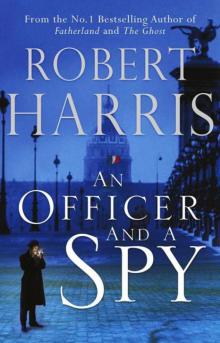 An Officer and a Spy
An Officer and a Spy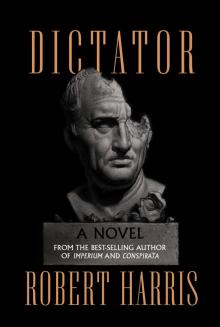 Dictator
Dictator Imperium:
Imperium: Enigma
Enigma Fatherland
Fatherland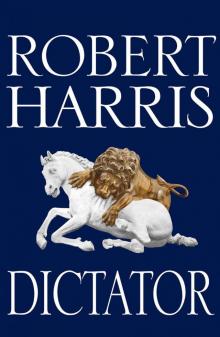 Dictator:
Dictator: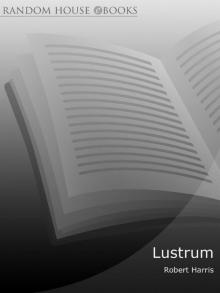 Lustrum
Lustrum Archangel
Archangel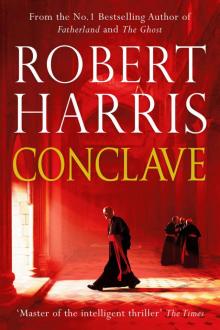 Conclave
Conclave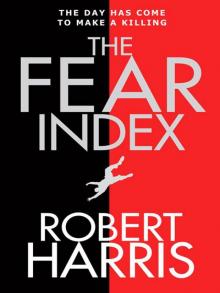 The Fear Index
The Fear Index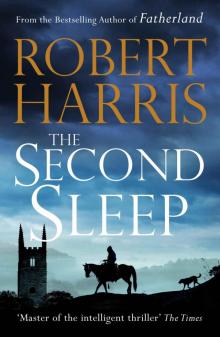 The Second Sleep
The Second Sleep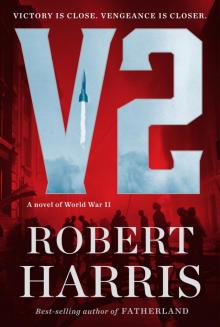 V2
V2 Lustrum c-2
Lustrum c-2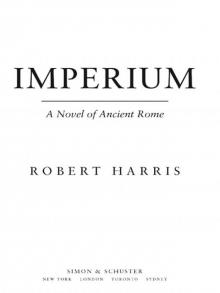 Imperium
Imperium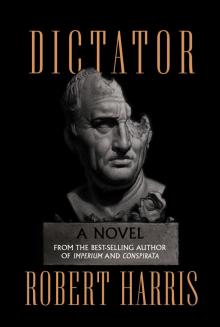 The Dictator
The Dictator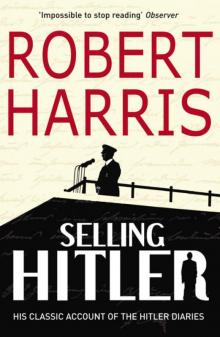 Selling Hitler
Selling Hitler Archangel (Mass Market Paperback)
Archangel (Mass Market Paperback)